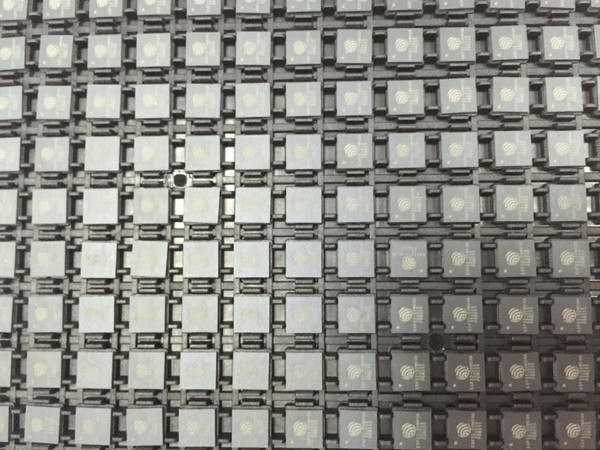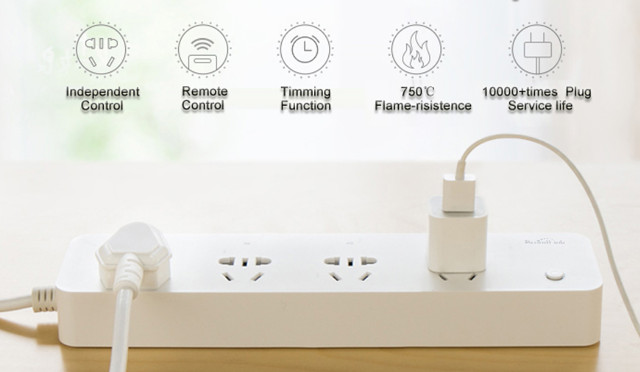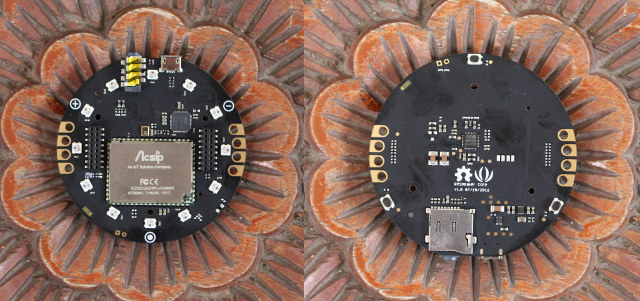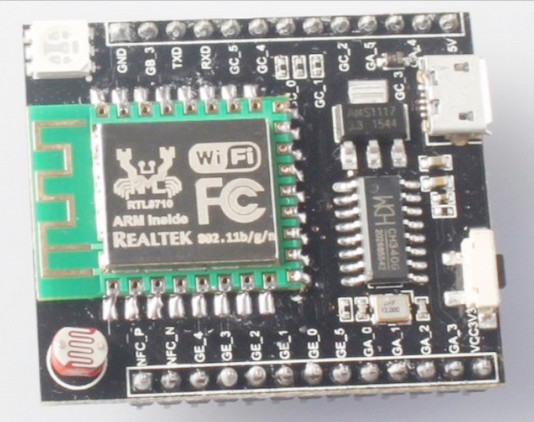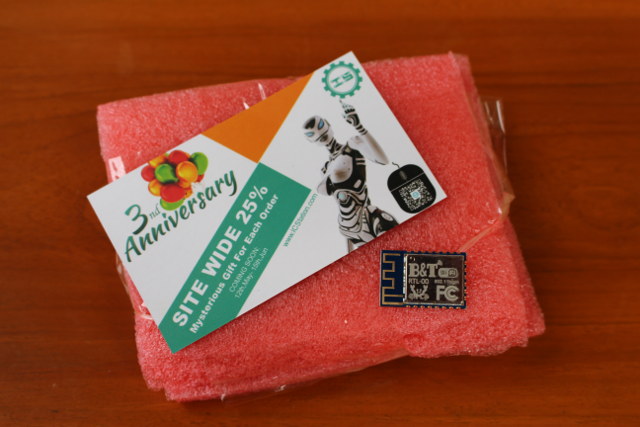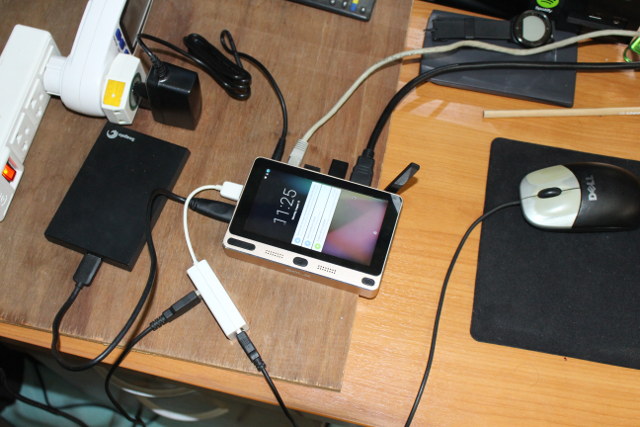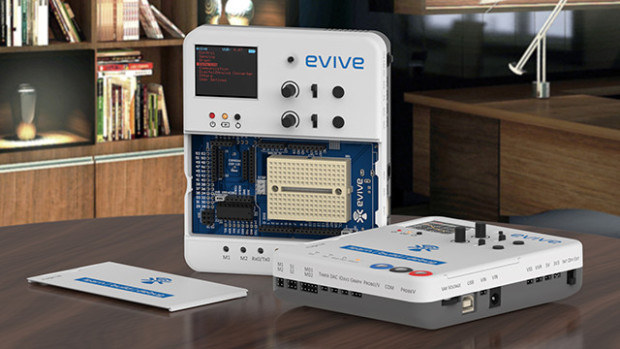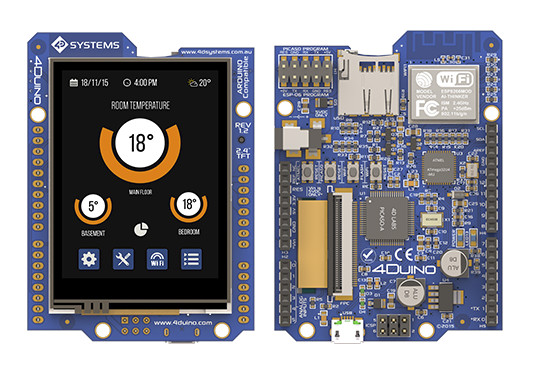Espressif ESP32 is one of the most awaited chip for IoT applications as it combines a dual core processor, WiFi, Bluetooth 4.0, and various I/Os. The good news is that you can now purchase ESP32 for 19 RMB ($2.85) on Taobao, or if you are not based in China, contact Espressif by email at sales [at] espressif.com. Availability is however limited, and the maximum order is now 5 pieces. ESP32 modules and boards, as opposed to just the SoC, are not quite ready right now, but should become available in a few weeks. ESP-WROOM-32 is the ESP32 module developed by Espressif, and NodeMCU is also working on an ESP32 board, so we’ll get more good news very soon. You can also find documentation, hardware and software resources on a Espressif ESP32 page , including a getting started guide, ESP32 SDK, ESP32 reference manual, ESP-WROOM-32 datasheet, and more. If you are […]
Broadlink MP1 is a $20 WiFi Power Strip with 4 Independent Sockets
There are plenty of WiFi sockets going around such as Broadlink SP2 or Kankun KK-SP3, but in some cases it might be both more convenient and cheaper to get a WiFi power strip, and Broadlink MP1 offers just that with 4 sockets that can be controlled and programmed (timer) independently, and sold for just $19.88 on Banggood. Broadlink MP1 specifications: Connectivity – 802.11b/g/n WiFi, controllable over 3G/4G with smartphone 4 multi-standard (EU/US/AU, but not UK) sockets Power input – 10A/250V (max) Power output – 10A/250V (max) Rated power – 2000W Total Misc – Power button Dimensions – 254mm x 60mm x 32mm; 50cm sockets spacing; cord Length – 1.5m with AU plug (Adapter provided for other countries) Weight – 450g The power strip can be controlled via Broadlink ihc (Intelligent Hone Control) app available for Android and iOS, which lets you independently manually turn on or off or set timers […]
ReSpeaker WiFi IoT Board is Designed for Voice Interaction (Crowdfunding)
More and more devices are supporting voice interaction nowadays from your smartphone to devices like Amazon Echo, but so far, I had not seen development boards specifically designed for that purpose, and that’s exactly what Seeed Studio ReSpeaker board does by combining audio capabilities, WiFi connectivity, and I/O headers. ReSpeaker Core board specifications: WiFi Module – Acsip AI7688 Wi-Fi 802.11 b/g/n module based on Mediatek MT7688 MIPS SoC Storage – micro SD card slot USB – 1x micro USB port for programming and power Audio – 3.5mm AUX port, WM8960 audio codec, 2-pin header for external speakers Expansion – 2x 8-pin expansion headers for I2C, GPIO and USB 2.0 host connected to MT7688, built-in microphone. MCU – Atmel ATMega32U4 @ 16 MHz Misc – 12x RGB LEDs, 8x touch sensors, 3 push buttons Power Supply – 5V DC Dimensions – 70mm diameter Weight – 70 grams The board runs OpenWrt, […]
Realtek RTL8710 Witty-like WiFi IoT Board with micro USB Port Sells for $8 / 35 RMB
Realtek RTL8710 could eventually become a serious competitor to ESP8266, as it’s based on ARM Cortex M3, provides many of the same features, and sells for roughly the same price. While currently software support is still work in progress and community is very small, I’ve recently written a quick start guide using AT commands to control RTL8710 connectivity in station and access point mode, and commands are also available for GPIO, OTA firmware updates, servers… This however requires some soldering and a USB to TTL debug board, and is not quite as convenient as ESP8266 board like NodeMCU. Some RTL8710 and RTL8195 development boards are already available but they cost over $25, but I’ve been informed of a cheap no-name RTL8710 board with a micro USB port for programming and power, and well as headers with GPIOs, UARTs, NFC, and power pins, that looks somewhat similar to ESP8266 Witty board. […]
Getting Started with B&T RTL-00 RTL8710 Module – Serial Console, AT Commands, and ESP8266 Pin-to-Pin Compatibility
The announcement of the ultra-low cost ARM based Realtek RTL8710 WiFi modules for IoT applications generated quite a lot of buzz since they can potentially compete with the popular ESP8266 modules. The main problem at the time was documentation and software support, but after some searches we could find that RTL8710 was part of Realtek Ameba family, and found some documents and an SDK for RTL8710/RTL8711/RTL8195. ICStation also kindly provided one B&T RTL-00 module for review, which costs $3.55 shipped per unit, and as low as $2.85 if you purchase 10 or more. The question here is how to get started? The answer can be found in page 8 of the Chinese datasheet for the module with GB0 and GB1 pins used for Tx and Rx to access the serial console. Time for some soldering… For the first test, we’ll just need Tx (GB1), Rx (GB0), GND and 3.3V, and […]
GOLE1 mini PC Tablet Review – Part 2: Android 5.1 and Windows 10
GOLE1, also called GOLE1 F1, is an interesting device because it’s quite difficult, it’s like the offspring of a mini PC and a tablet with a smallish phone-like 5″ capacitive touch screen. It also dual boot Windows 10 and Android 5.1. I’ve already discussed about the hardware, and taken picture of the device, accessories, and motherboard, in the first part of the review, so today I’ll report my experiences with Windows 10 and Android 5.1, as well as the potential use cases. Since I’ve already reviewed Intel Atom x5-Z8300 mini PCs, as well as a dual boot Windows and Android Intel mini PC, I’ll focus on what makes GOLE1 different in this review. GOLE1 Dual Boot and Use Cases I normally check my emails on my smartphone while having breakfast in the morning, but one day the charging micro USB cable was not connected properly to my phone, so I […]
Evive is an Arduino Compatible Platform with Enclosure, Lots of I/Os, Buttons, and an 1.8″ Display (Crowdfunding)
Engineers at Agilo Technologies, an Indian startup based in Kanpur, Uttar Pradesh, felt that the wire mess often produced while learning or prototyping with Arduino boards could be an issue, and it was easy to mis-wire your setup, so they’ve decided to create a user and student friendly Arduino compatible system with many of the items you’d normally use with Arduino board such as buttons, probes inputs, an 1.8″ color display, headers for ESP8266, Bluetooth, and XBEE moduels, etc.. and all of that enclosed in a neat case. Evive was born. Evive specifications: MCU – Atmel ATmega2560 8-bit AVR MCU @ 16 MHz with 256KB flash, 4KB EEPROM, 8KB SRAM Storage – micro SD slot up to 32GB Display – 1.8″ TFT display; 160×128 resolution; 18-bit color User inputs – Tactile and slide switches, joysticks, and potentiometers Probes inputs – Voltage / Intensity sensing inputs USB – USB device port Expansion Headers […]
4Duino-24 is an Arduino compatible 2.4″ Color IoT Display Module with Atmel MCU and ESP8266 Module
I played with ITEAD Studio NEXTION serial color displays for Arduino boards and the likes a few months ago, and while the hardware seems good and the company offer a large choice of 2.4″ to 7″ models at a very affordable price, I didn’t find the Windows software to create the user interface to be very user-friendly. 4D Systems, an Australian company specializing in “graphics solutions”, will soon launch a similar 2.4″ display, but integrated into an Arduino compatible board also featuring an ESP8266 module for WiFi connectivity. 4Duino-24 “LCD IoT Display Module” specifications: MCU – Atmel ATmega32U4 micro-controller with 32KB flash, 2.5KB SRAM, 1KB EEPROM Storage – micro SD card slot (FAT16 support) for data and logging WiFi Module – ESP8266 based with 802.11 b/g/n connectivity, 1MB flash, support for Wi-Fi Direct (P2P), soft-AP Display – 2.4” LCD-TFT resistive touch display module with 240×320 resolution, 65K colors, and powered […]


